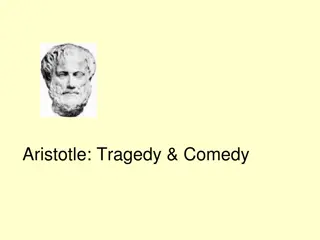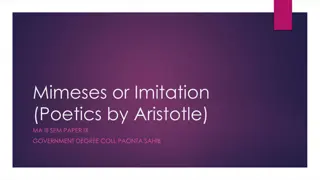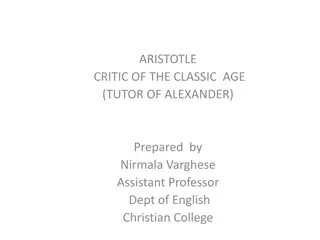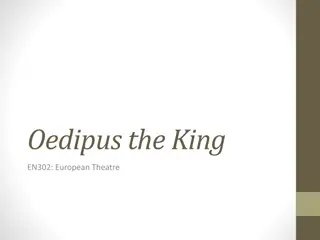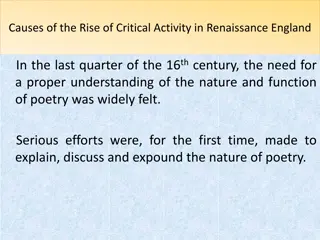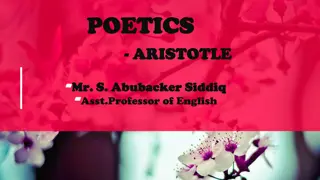Aristotle's The Poetics: Tragedy and Comedy Analysis
Aristotle, the Greek philosopher, introduced key concepts in his work The Poetics, focusing on tragedy and comedy. He countered Plato's views on literature and emphasized the importance of imitation, catharsis, and the unity of time, place, and action in dramatic composition.
0 views • 32 slides
The Theory of Mimesis in Aristotle's Poetics
Aristotle's theory of mimesis, outlined in his work "Poetics," contrasts with Plato's view by emphasizing that art imitates nature. He believes that poetry expresses the universal while history narrates the particular, highlighting the poet's freedom from factual constraints to explore larger truths
0 views • 12 slides
Understanding Aristotle's Poetics: A Critique of the Classic Age
Aristotle, a tutor to Alexander the Great, delves into fundamental concepts in his work "Poetics." He challenges Plato's view of imitation, emphasizing creativity. Focusing on Mimesis, Katharsis, Hamartia, and Spoudaios, he explores the essence of art and tragedy, highlighting noble character and tr
0 views • 7 slides
Analysis of Blame and Tragedy in Oedipus the King and Aristotle's Poetics
The question of blame is central in "Oedipus the King," where the city faces a plague and seeks accountability. Aristotelian concepts of tragedy, as outlined in "Poetics," delve into the structure and components of a tragic work, emphasizing plot development and cathartic emotions of pity and fear.
0 views • 28 slides
Causes of the Rise of Critical Activity in Renaissance England
In the last quarter of the 16th century, Renaissance England saw a surge in critical activity surrounding poetry. This was spurred by factors such as the medieval view of poetry, the appreciation of poetry in courtly circles, influence from the rediscovery of Aristotle's Poetics, and challenges pose
0 views • 6 slides
Aristotle's Poetics: An Overview of the Masterpiece
Aristotle's "Poetics" is a seminal work that delves into the essence of poetry, particularly tragedy and comedy. Written around 335 B.C., this treatise challenges Plato's ideas on mimesis and offers insights into poetry's societal significance. Divided into six parts, it explores various elements of
0 views • 15 slides
